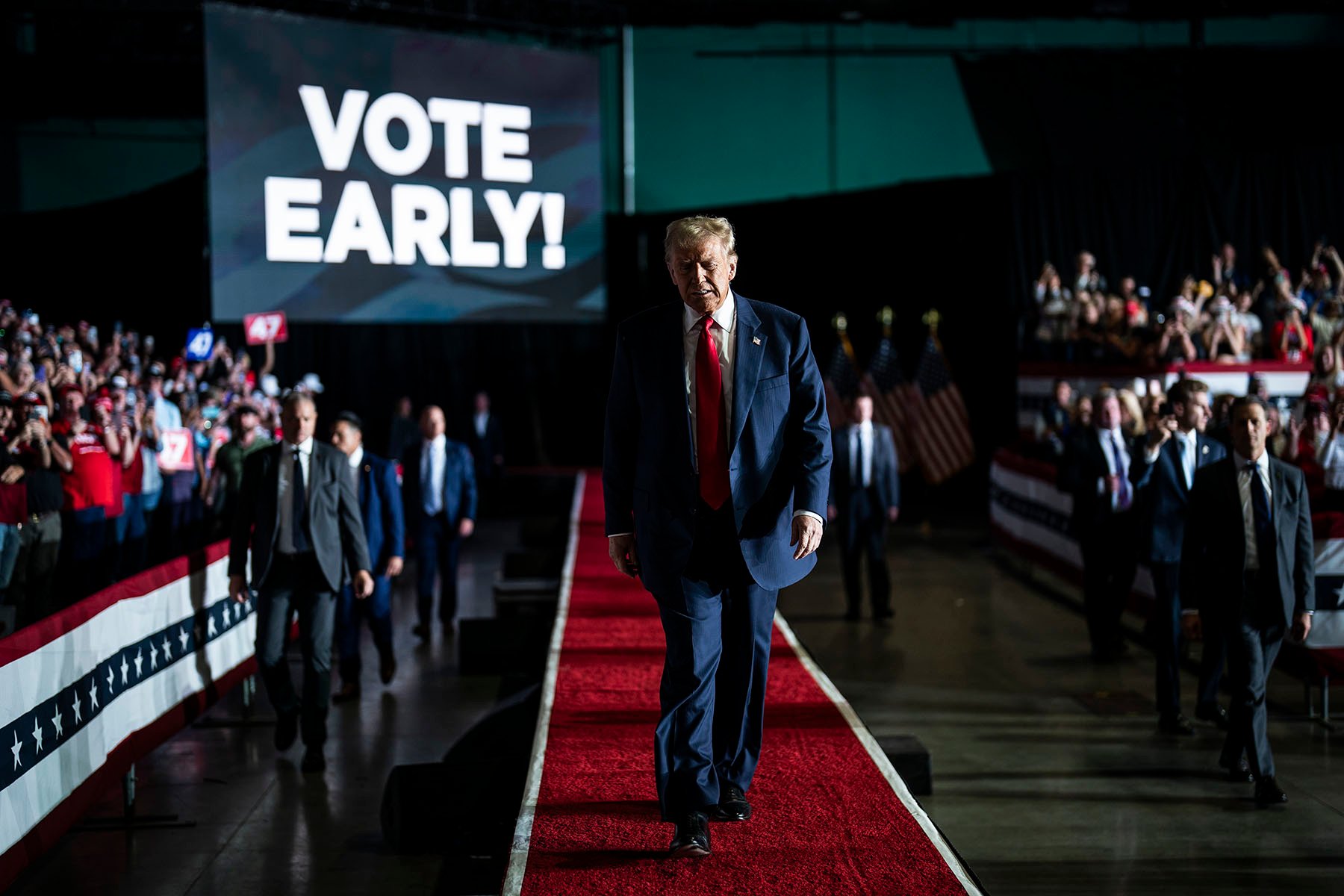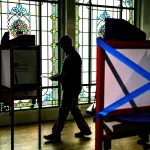The 19th is committed to covering the unfinished business of voting rights. Read more about how we’re approaching that in this pivotal election.
Samantha Shepherd thinks a lot about the power of messaging as communications manager at the Loudoun County elections office in Northern Virginia.
She often fields voting-related questions from people who call to ask about processes and deadlines. Increasingly, they’re also asking about whether noncitizens are voting.
They’re not, Shepherd explains while trying to quickly establish credibility about the electoral process. Sometimes the calls are quick. Other times, she and other election administrators find themselves spending a significant amount of time debunking myths about the accuracy of the voter rolls.
“Usually we’re kind of able to de-escalate the conversation, and kind of talk about our benchmarks and our own security features in our list maintenance,” she said. “That can help voters — but it takes time.”
For months, former President Donald Trump and his Republican allies have been spreading false narratives about noncitizen voting — and with weeks to go before the presidential election, they are ramping up their messaging and tactics. That includes new lawsuits challenging the validity of some voter registrations and carrying out audits of voter rolls that search for noncitizens.
These efforts are sowing seeds of public mistrust and setting the stage for legal challenges to the election results if Vice President Kamala Harris wins the presidency, voting experts warn.
“It’s putting our future elections at risk. It’s putting all of our votes at risk,” said Lizzie Ulmer, senior vice president of strategy and communications at States United Democracy Center, a nonpartisan organization that advocates for fair elections. “It’s something that is feeding doubt in our elections and that is going to potentially be used to try to overturn the will of the people.”
Trump claimed without evidence on social media over the summer that Democrats are going as far as encouraging undocumented immigrants entering the country to vote for them. He repeated the lie during the September presidential debate with Harris. It is illegal for noncitizens to vote in state and federal elections, and it is rare.
Trump repeatedly uses anti-immigrant rhetoric and has promised mass deportations if reelected. He previously scapegoated noncitizens in casting doubt about previous U.S. elections. He claimed falsely that noncitizens contributed to Hillary Clinton’s popular vote advantage in the 2016 presidential election. The former president has not committed to accepting the results of the upcoming election if he loses — and, based on what he has said, he may well blame his loss on votes by noncitizens.
Trump’s allies, including wealthy investor Elon Musk, have spread similar messaging about noncitizen voting.
This week, CBS News reported on a virtual election training video featuring a group associated with election denialism that included instructions for attendees to flag voters with “Hispanic-sounding last names” for potentially suspicious activity — in essence, equating the perceived origin of a person’s name with their citizenship status and, with that, raising concerns about safety at the ballot box.
Now Republicans in several states are using the false narratives about noncitizens to challenge voter registrations and introduce new policy:
- In states like Florida and Texas, Republican officials have filed lawsuits against the federal government to verify the immigration status of registered voters.
- In Indiana, the Republican secretary of state and attorney general sent a letter to the federal government asking officials to verify the citizenship status of more than 585,000 registered voters.
- In states like Wisconsin and Iowa, voters will consider whether to change state constitutions to specify that only U.S. citizens can vote. (A 1996 federal law already makes it illegal for noncitizens to vote. Eligible voters also confirm under penalty of perjury that they are U.S. citizens).
Federal law prohibits widespread voter purges 90 days before a federal election.
In recent days, Republican secretaries of state in Iowa and Georgia have also announced audit results of voter rolls that target noncitizens. Joshua A. Douglas, a law professor at the University of Kentucky, said the figures merit context and actually show America’s election system is working.
“There will always be slight inaccuracies in the voter rolls when states are processing millions of people and almost always these inaccuracies are benign,” he said in an email. “So, the public should recognize the claims for what they are: attempts to sow doubts about the election process when the reality is that noncitizens are not voting in massive numbers.”
The efforts are having immediate impact, including on eligible voters. In Alabama, a federal judge recently blocked an effort by the Republican secretary of state to remove more than 3,200 registered voters that he said had “noncitizen identification numbers” by the Department of Homeland Security. It has since been determined that many of the targeted people are eligible to vote.
Ulmer said attempts to throw out the registrations of eligible voters is detrimental to democracy.
“No matter what issue really matters to you — whether it’s reproductive rights, whether it’s education, whether it’s health care — all of those issues really run through us having free, fair and secure elections and the will of the people being respected,” she said.
Trump and his allies filed more than 60 lawsuits to challenge his 2020 loss to President Joe Biden. Most failed, yet Trump’s rhetoric culminated in a violent insurrection at the U.S. Capitol on January 6, 2021.
Since Harris became the presidential nominee this summer, Trump has challenged the Democrat’s candidacy in a way that goes beyond general competition between major party candidates. The former president has questioned everything from Harris’ race to whether she worked at McDonald’s in college. It’s unclear how intentional Trump has been in his messaging as it relates specifically to Harris’ gender, said Kelly Dittmar, director of research at the Center for American Women and Politics.
“Trump has primed them, not so much by saying a woman can’t win, but by priming sexism and racism, and people looking at that sexism and racism and saying, ‘Wow, this country’s so sexist and racist how could we ever elect a Black and South Asian woman?’” she said.
The Harris campaign has laid out its legal strategy in a memo obtained by The 19th. In it, the campaign accuses Republicans of filing frivolous lawsuits and then delaying their resolution.
“They know that when judges reject their baseless claims, it undermines their communications strategy,” according to the memo. “So they file cases and then slow-walk them in court, deliberately letting them fester instead of trying to get judges to rule before Election Day.”
Though the scope of attention on noncitizen voting is heightened this year, the narrative that noncitizens are voting goes back years, said Maggie Toulouse Oliver, the Democratic secretary of state for New Mexico who has now worked multiple presidential elections as an election administrator.
“This is something that gets brought up every single presidential election, and it is something that we have pursued through various means in our state over the last couple of decades, to try to suss out whether or not there is truth to the notion that — maybe not an individual here or an individual there, but that a big number of noncitizens — have made it onto our voter rolls and or have been voting,” Toulouse Oliver said during a recent press call with reporters. “We’ve never found the problem that is being suggested.”
The myth about noncitizen voting has led some Republicans to take additional action on civic engagement groups. In Texas, Republican Attorney General Ken Paxton announced in August he would investigate claims that groups were registering noncitizens to vote. One of those groups, Jolt Initiative, a civic engagement organization, has filed a federal lawsuit against Paxton.
Texas lawmakers have indicated plans to consider legislation that would require residents to show proof of citizenship to register to vote. The Republican New Hampshire governor signed similar legislation into law in September. It is scheduled to go into effect after the general election, and civic engagement groups have challenged the law in court.
-
Read Next:
“As a Latino organization, we work with integrity. We make sure that we’re dotting our T’s, crossing our I’s, and so while it was an unwelcome situation to be part of — because nonprofits also we have to raise money for those legal expenses — we are also very adamant about making sure that our voice is heard and that representation matters across the state,” said Diana Maldonado, executive director of Jolt Initiative.
Jolt Initiative works to do voter outreach among young Latinx communities and people who are recently naturalized citizens. Maldonado said mis- and disinformation toward immigrants could lead to safety issues for voters and staff. She said her organization is having safety training and conversations with peer organizations and allies.
“We’re going to continue to move forward because there is a need to register our next generation of leaders, our next generation of voters and our next generation of Latinos to be representative in their voice of democracy in our state,” she said. “Right now it isn’t, but I think that’s what compels Jolt Initiative to do this work day in and day out.”
There are ways in which the consequences of election denialism are different compared to 2020. Congress has since passed the bipartisan Electoral Count Reform Act to update the post-election vote certification process, a move that voting experts have said could reduce the chances of repeating the 2021 insurrection. Several statewide officials in key battleground states have also committed to ensuring ballots are certified on time.
Ulmer noted that election officials have more security measures in place, in conjunction with law enforcement, to ensure the safety of election administrators, poll workers and the general public.
“Coming into 2020, those weren’t really conversations that were happening or preparedness plans that were being put together. And coming into 2024 it is very much something that election officials and law enforcement leaders and pro-democracy leaders are thinking about — is how do we keep voters and election officials safe this cycle?” she said. “Just like the anti-democracy movement has evolved, and there’s still this concern and very heightened threat environment, there has been a real supercharged effort on the pro-democracy side to keep people safe.”
Shepherd in Virginia noted that her office has several people who work full-time on voter maintenance, or the process of updating and verifying the accuracy of voter rolls. The key, she said, is to communicate that to the public.
“Ultimately, at the end of the day, we want our voters to feel confident. We want our voters to feel excited that their vote counted,” she said. “So we are trying to meet the voters where they are because we work with this every single day. They don’t.”
To check your voter registration status or to get more information about registering to vote, text 19thnews to 26797.






